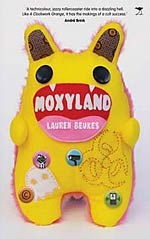
![]() Rhondak101
Rhondak101
5/7/2014
![]()
I wanted to like this book. I really, really did. Unfortunately, I found it unsatisfying. First, I liked the future world that Beukes created. The idea that our phones will eventually become our banks, our keys, and our passports was handled cleverly. The phone in this book plays the role of both the mark of the human and the great punisher when the human violates society's codes. Like I said, very clever.
I also enjoyed Beukes' writing style. Her futuristic, cyberpunk slang is clear and foreign at the same time. What I mean is: I know what she means by the word (more or less) but I could not define the word for someone else at all. Again, a very clever use of language.
What I did not like was basically everything else: the characters, the plot, and the lack of examination or explanation of events and character motivation. Most of the negative reviews of Moxyland focus on the reviewers' dislike of the four main characters' personalities. It is true that they are very flawed and, therefore, not particularly likeable. I didn't mind that so much. My problem with the characters is they are all static, flat characters. There's no development whatsoever. Each character stands for one thing and never waivers from just representing that one thing. When they do finally act, they either act because of this one-driving idea or because of some unexplored reason (more on this below).
And then there's the plot. Because there are four first-person narrators, the book reads like a series of vignettes that documents each character's life. Often one of these characters interacts with one of the other characters, so we see that character from another perspective. Yet, I was halfway through the book, and it still felt as if she was introducing us to the characters. I kept waiting for something, anything to happen. That something does happen with about one-third or one-fourth of the book left (I was reading on an ereader, so it's hard to tell). Once the thing does happen, each character gets his or her "ending" based on his or her relationship to the series of events that are caused by the thing. These "endings" go by unanalyzed and unexplained.
This is the other problem of Moxyland. Because of the first-person narration, there is no voice that explains what happens outside of the characters' viewpoints or analyzes interesting moments or threads that appear from any kind of exterior view. There are lots of good ideas in this book, but they all remain unexplored. Some of these unexamined moments are merely frustrating because Beukes brings them up never to return to them. Other unexamined moments lead to a conclusion that I found entirely unsatisfying (and also rushed.) Yet, what is good about this book makes me want to try her other books. So, I will be reading Zoo City and The Shining Girls in the future.